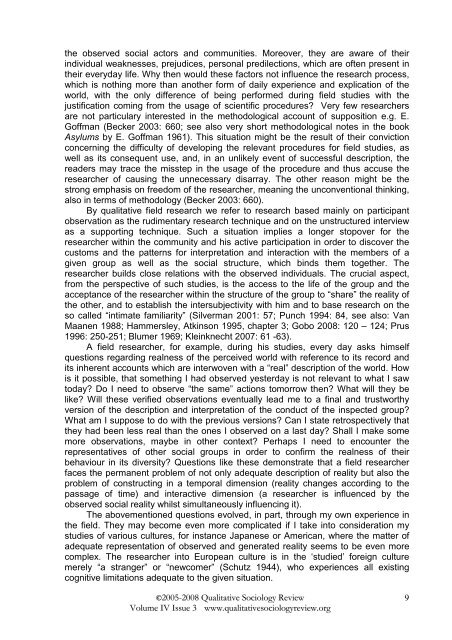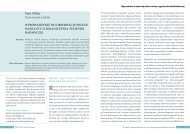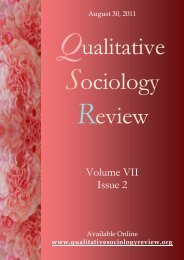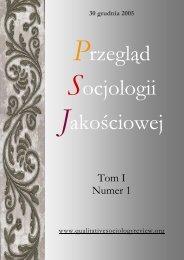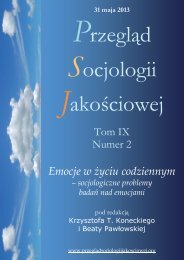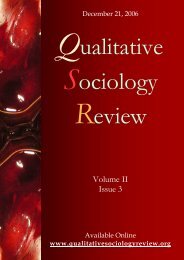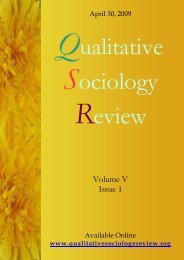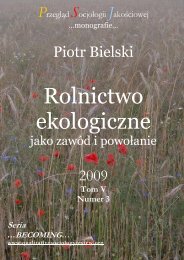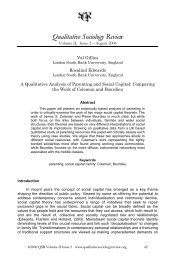volume IV is 3 - Qualitative Sociology Review
volume IV is 3 - Qualitative Sociology Review
volume IV is 3 - Qualitative Sociology Review
You also want an ePaper? Increase the reach of your titles
YUMPU automatically turns print PDFs into web optimized ePapers that Google loves.
the observed social actors and communities. Moreover, they are aware of their<br />
individual weaknesses, prejudices, personal predilections, which are often present in<br />
their everyday life. Why then would these factors not influence the research process,<br />
which <strong>is</strong> nothing more than another form of daily experience and explication of the<br />
world, with the only difference of being performed during field studies with the<br />
justification coming from the usage of scientific procedures? Very few researchers<br />
are not particulary interested in the methodological account of supposition e.g. E.<br />
Goffman (Becker 2003: 660; see also very short methodological notes in the book<br />
Asylums by E. Goffman 1961). Th<strong>is</strong> situation might be the result of their conviction<br />
concerning the difficulty of developing the relevant procedures for field studies, as<br />
well as its consequent use, and, in an unlikely event of successful description, the<br />
readers may trace the m<strong>is</strong>step in the usage of the procedure and thus accuse the<br />
researcher of causing the unnecessary d<strong>is</strong>array. The other reason might be the<br />
strong emphas<strong>is</strong> on freedom of the researcher, meaning the unconventional thinking,<br />
also in terms of methodology (Becker 2003: 660).<br />
By qualitative field research we refer to research based mainly on participant<br />
observation as the rudimentary research technique and on the unstructured interview<br />
as a supporting technique. Such a situation implies a longer stopover for the<br />
researcher within the community and h<strong>is</strong> active participation in order to d<strong>is</strong>cover the<br />
customs and the patterns for interpretation and interaction with the members of a<br />
given group as well as the social structure, which binds them together. The<br />
researcher builds close relations with the observed individuals. The crucial aspect,<br />
from the perspective of such studies, <strong>is</strong> the access to the life of the group and the<br />
acceptance of the researcher within the structure of the group to “share” the reality of<br />
the other, and to establ<strong>is</strong>h the intersubjectivity with him and to base research on the<br />
so called “intimate familiarity” (Silverman 2001: 57; Punch 1994: 84, see also: Van<br />
Maanen 1988; Hammersley, Atkinson 1995, chapter 3; Gobo 2008: 120 – 124; Prus<br />
1996: 250-251; Blumer 1969; Kleinknecht 2007: 61 -63).<br />
A field researcher, for example, during h<strong>is</strong> studies, every day asks himself<br />
questions regarding realness of the perceived world with reference to its record and<br />
its inherent accounts which are interwoven with a “real” description of the world. How<br />
<strong>is</strong> it possible, that something I had observed yesterday <strong>is</strong> not relevant to what I saw<br />
today? Do I need to observe “the same” actions tomorrow then? What will they be<br />
like? Will these verified observations eventually lead me to a final and trustworthy<br />
version of the description and interpretation of the conduct of the inspected group?<br />
What am I suppose to do with the previous versions? Can I state retrospectively that<br />
they had been less real than the ones I observed on a last day? Shall I make some<br />
more observations, maybe in other context? Perhaps I need to encounter the<br />
representatives of other social groups in order to confirm the realness of their<br />
behaviour in its diversity? Questions like these demonstrate that a field researcher<br />
faces the permanent problem of not only adequate description of reality but also the<br />
problem of constructing in a temporal dimension (reality changes according to the<br />
passage of time) and interactive dimension (a researcher <strong>is</strong> influenced by the<br />
observed social reality whilst simultaneously influencing it).<br />
The abovementioned questions evolved, in part, through my own experience in<br />
the field. They may become even more complicated if I take into consideration my<br />
studies of various cultures, for instance Japanese or American, where the matter of<br />
adequate representation of observed and generated reality seems to be even more<br />
complex. The researcher into European culture <strong>is</strong> in the ‘studied’ foreign culture<br />
merely “a stranger” or “newcomer” (Schutz 1944), who experiences all ex<strong>is</strong>ting<br />
cognitive limitations adequate to the given situation.<br />
©2005-2008 <strong>Qualitative</strong> <strong>Sociology</strong> <strong>Review</strong><br />
Volume <strong>IV</strong> Issue 3 www.qualitativesociologyreview.org<br />
9


